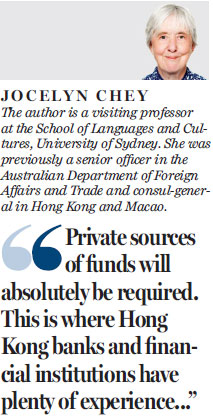Fundraising will be central to Hong Kong's role in the Belt and Road vision
Updated: 2016-06-23 07:40
By Jocelyn Chey(HK Edition)
|
|||||||||
The concept of Belt and Road (B&R) surfaced some two years ago, at first only vaguely defined as embodying some references gleaned from two speeches President Xi Jinping delivered in September and October 2013. I have been pondering what it might mean for Hong Kong ever since I first heard about it.
In Xi's first speech, he referred to a "Silk Road Economic Belt" roughly following the ancient trade route from China to Europe through Central Asia, which would be rehabilitated and reactivated through modern road and rail construction. This would clearly draw on the skills and expertise of China's State and private sector companies, who have completed extensive networks linking all corners of the mainland. In his second speech, Xi proposed an equivalent "Maritime Silk Road" to link China's eastern ports to Europe via Southeast Asia, around the Indian subcontinent, doubling back around the Bay of Bengal then across the Indian Ocean, grazing the east coast of Africa then straight up through the Suez Canal. In the two years since these speeches, the proposal for the two roads has been elaborated to incorporate aid projects that would apply China's unique development model to other countries and offer finance through the Asian Infrastructure Investment Bank. Does the "Maritime Silk Road" include Hong Kong? If so, what is the benefit to other countries such as Australia of engaging with Hong Kong if they wish to participate in this initiative?

Commentators in the international press have mainly focused on how B&R might function as industry policy, exporting excess capacity in industries concerned with infrastructure construction as China's economy slows and rebalances. But some strategic analysts have also seen it as an attempt to reshape the geopolitics of the regions it embraces. There is some truth in both descriptions but to me, above all, B&R is a financial concept and a pan-continental infrastructure plan, and whether and to what extent it succeeds will depend on its scale and who funds it and where those funds are derived and applied. So, what about Hong Kong?
Recent decades have seen a global shift in financial power from the developed to the developing world as Western economies experience a prolonged period of sluggish growth. Central banks, which are responsible for stabilizing the macro-economy, including raising economic activity to its maximum potential level, have proved hesitant and timid and shifted blame for the downturn onto governments. The International Monetary Fund (IMF) is now warning of imminent recession. "Growth has been too slow for too long," Maurice Obstfeld, the IMF's chief economist, said in April, adding that the threat of synchronized slowdown required "bold multilateral actions to boost growth and contain risks at this critical stage of the global recovery". Over the same decades the outstanding growth in GDP has come from China and India and even though China's growth has tapered off, it still clearly outperforms any country in Europe or the Americas. In addition, during this period we have seen the evolution of a distinctive Chinese concept of development finance. A recent study by academics at Boston University and the Chinese Academy of Social Sciences showed that overseas lending by Chinese institutions has doubled the amount of finance available in the world economy, and China is now a bigger presence in development finance than the top six multilateral financial institutions put together. The fund supporting B&R amounts to $40 billion.
Bonnie Shek, representing the Hong Kong Trade and Development Council (HKTDC), recently made a presentation about B&R to the Australian Institute of International Affairs in Sydney, inviting local companies to participate in a summit conference in Hong Kong and learn more about opportunities. She emphasized Hong Kong's advantages as an international communication hub and the wide range of financial and professional services available in Hong Kong. In my view, Bonnie Shek missed the point. The HKTDC has not yet presented a convincing argument as to why Australian and other companies should involve Hong Kong. Even if it were argued that Hong Kong could develop its role as an entrept and trade point on the "Maritime Silk Road", for instance utilizing the resources of the lively Indian business community to facilitate exchanges with South Asian countries, this would not do much to convince Australian companies of the benefits of working through Hong Kong rather than through mainland contacts.
When we look at the potential role of Hong Kong financial institutions, however, the arguments become much more compelling. The financial sector in Hong Kong should be advertising its expertise applicable to B&R. China's $40 billion fund will hardly meet all the needs of the costly infrastructure projects under consideration. The Asian Development Bank has estimated that Asia will require $8 trillion for infrastructure before 2020. Private sources of funds will absolutely be required. This is where Hong Kong banks and financial institutions have plenty of experience and expertise, and surely by participating in this way Hong Kong can secure its future and work with the Chinese mainland in the development of international aid funding.
(HK Edition 06/23/2016 page9)